This Week in Anime
Why Vinland Saga's New Season is Even Better
by Nicholas Dupree & Steve Jones,
The second season of Vinland Saga is shaping up to be appointment viewing with the return of Thorfinn and Einar try to survive a system created to break them down while King Canute has no qualms about burning everything down.
This series is streaming on Crunchyroll and Netflix.
Disclaimer: The views and opinions expressed by the participants in this chatlog are not the views of Anime News Network.
Spoiler Warning for discussion of the series ahead.
 @Lossthief
@Lossthief
|
 @BeeDubsProwl
@BeeDubsProwl
|
 @NickyEnchilada
@NickyEnchilada
|
 @vestenet
@vestenet
|
Steve
Nick, to be honest, I've only been able to take a glance at this week's assignment, but from the looks of it, we're in for another one of those tepid, slow-life, "learning to harvest barley because my party leader threw me off a sheer cliff" type of shows. Boooring.

Nick, to be honest, I've only been able to take a glance at this week's assignment, but from the looks of it, we're in for another one of those tepid, slow-life, "learning to harvest barley because my party leader threw me off a sheer cliff" type of shows. Boooring.
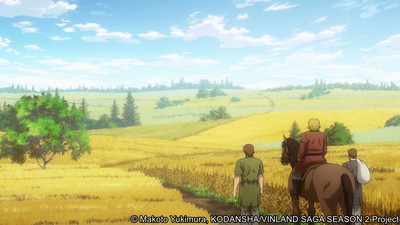
Nick
Yeah, we're in for a rough one today, Steve. But hopefully we can find something fun to talk about with Banished From the Hero-King's Party, I Decided To Live The Slow Life With My Warrior-Farming Skills. And, of course, like every isekai-adjacent series these days, there's a slavery plotline.


Yeah, we're in for a rough one today, Steve. But hopefully we can find something fun to talk about with Banished From the Hero-King's Party, I Decided To Live The Slow Life With My Warrior-Farming Skills. And, of course, like every isekai-adjacent series these days, there's a slavery plotline.


Okay, I can't bring myself to carry on this charade any longer because after being exposed to the umpteenth anime about buying people—for fun!—it was beyond refreshing to see the long-awaited second season of Vinland Saga pull no punches about how inherently dehumanizing slavery is.




And by "refreshing," I mean harrowing. Like it should be.
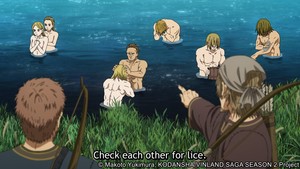
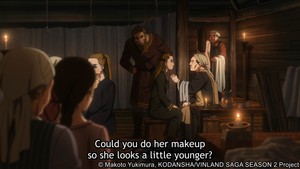

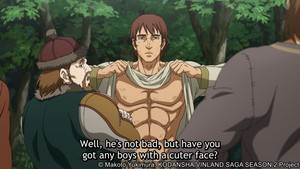
And by "refreshing," I mean harrowing. Like it should be.
Yep, Vinland Saga is back, and after a few years away, it's returned with an even more down-to-earth, historical, and incredibly bleak story to tell. Complete with poetry!






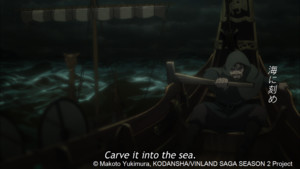

Stirring poetry and smearing blood on a newborn. The Vikings are back, baby.

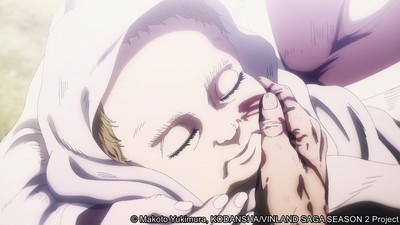
Well, sort of, anyway. Whereas season one was all about going a-Viking, there's only been, like, one and a third episodes with anything of the sort this season.
Yeah, it's immediately apparent that the story's taken a dramatic turn regarding tone and content, as it should! Recall the final moments of the first season, when Askeladd's grand gambit and sacrifice utterly shattered Thorfinn's grasp on his entire life. Everything he'd been living for disappeared in an instant. Both he and his narrative need to recalibrate from square one, essentially. And to drive that point home, we don't even begin the season with Thorfinn.


You have to give this season props for efficiency. The first season took multiple episodes before we saw a young man lose the light from his eyes in the face of the world's unfeeling cruelty. Einar gets there in like 10 minutes!
Sorry dude, the audience is pretty familiar with the pillaging horrors at this point, so you get the CliffsNotes tragedy and powerful yet ambiguous directive to live from a loved one.


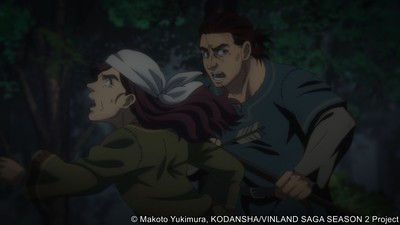
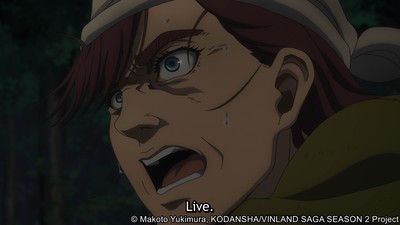
Though, I do like how much of Einar's story is a divergence from Thorfinn's. Einar is not the son of a legend - he's not even much help in a fight. Yet he is still dragged into the world's violence and forced to endure the loss and pain that comes to anyone at the bottom of a cruel system.

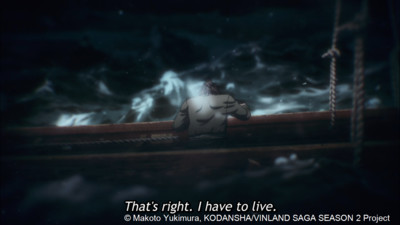
And lucky for him, Einar gets assigned to a farm for troubled young men trying to cope with their inherent frailty in a society that valorizes destructive standards of violence and machismo.


I love this dude's kindergarten teacher energy here like he's trying to get two kids to play together in the sandbox.

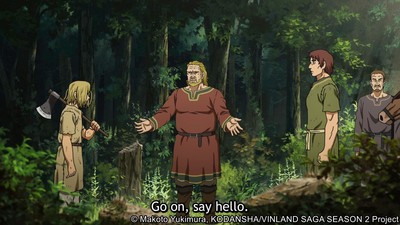
I love this dude's kindergarten teacher energy here like he's trying to get two kids to play together in the sandbox.
Ketil is an...interesting character. Like, at first glance, he seems like an almost magnanimous figure. He's got this huge, bountiful farm that he works alongside his workers. He's gracious and even asks Einar if he wants to come with him before buying him from the slave traders.

In many ways, he's almost the kind of "good" enslaver that all those isekai shows present their heroes as when buying underage elf-wives.
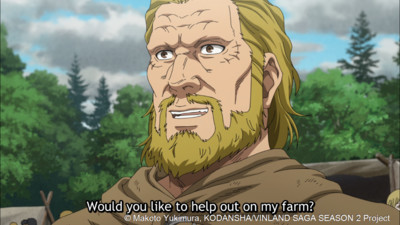
In many ways, he's almost the kind of "good" enslaver that all those isekai shows present their heroes as when buying underage elf-wives.
Only, of course, as Einar learns more about the farm, he finds that it too has impenetrable systems of hierarchy that oppress the people, like him, at its lowest rung. This isn't a culture that Ketil intentionally fostered, but it shows that the institution itself is unsalvageable. As long as one group of people is allowed to treat another group like property, no amount of magnanimity can counteract it.
I also appreciate how it highlights that the system's cruelty manifests regardless of intent. The dehumanizing act of enslavement is so normalized within the show's society that a seemingly nice person can casually say something this mortifyingly evil with a smile:

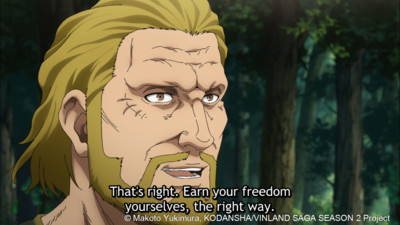
And the terrible kicker is that this is one of the best offers Einar will get after having his home and family destroyed by the Danes. So he's more than eager to put as much backbreaking work into it as needed, so long as there is that pinprick of light at the end of the tunnel. Everything else around him is just that dark.

His axe technique needs some work, though.

His axe technique needs some work, though.
No worries on that front. He'll have plenty of chances to practice.

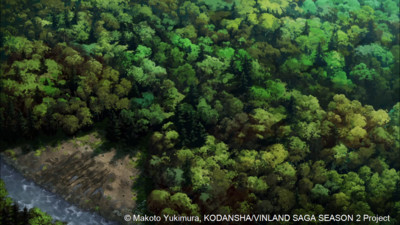
And he'll get plenty of help from the world's saddest horse.

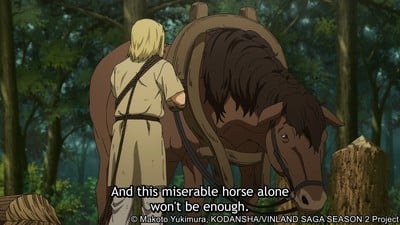
Of course, since this is such important work, the two of them will be well-supplied so they can get it taken care of efficiently and with minimal trouble!


Oh, right, shit. I forgot about that whole "irrational cruelty baked into the system" part.

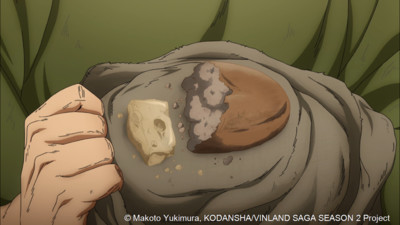
Oh, right, shit. I forgot about that whole "irrational cruelty baked into the system" part.
And you know the cruelty is especially irrational when it closely resembles high school bullying despite being a millennium removed from the invention of the locker room.


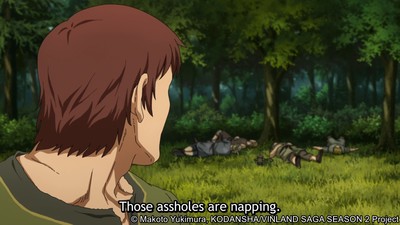

Einar's lucky they hadn't invented underwear or plumbing yet, or he'd have gotten history's first recorded wedgie and swirlie combo.

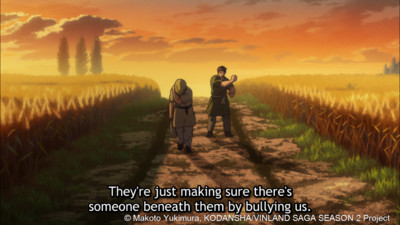
It's nice to know that insecure jocks with cowlicks have been around since immemorial.


God, Olmar really is a treasure. In a season filled with the casual, mundane cruelty of even a seemingly benevolent society, he's the shining doofus who keeps it from feeling totally oppressive.


No matter the time or place, there will always be cocky teenage boys way too big for their itchy wool breeches.
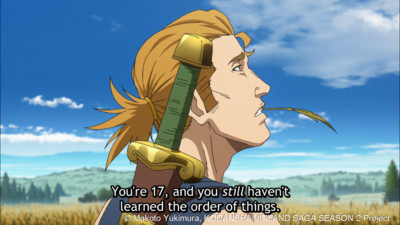
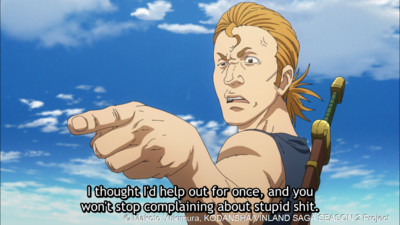
No matter the time or place, there will always be cocky teenage boys way too big for their itchy wool breeches.
When you get down to it, though, there's not a lot separating Olmar from season 1 Thorfinn—at least in terms of bravado, not skill. But that bravado is the more sinister component, and Olmar's character arc is where we see that darkness creep back into the story. Because as much as everyone (including me) loves to make the "Farmland Saga" joke, Vinland Saga hasn't forgotten how to exhibit and interrogate violence in meaningful ways.


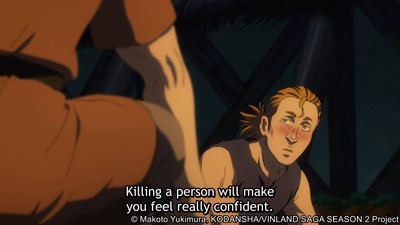
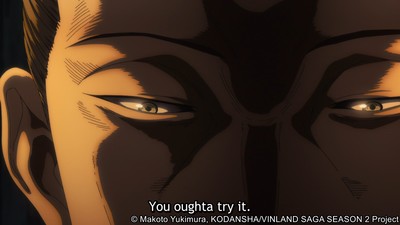
If anything, it's doing it more expertly than ever. Like Einar, Olmar is far from the revenge-fueled berserker Thorfinn was in season one. Instead, he's a regular young man, enamored with the myth of warrior culture but wholly unprepared for the brutal reality. By which I mean he can't get his sword up:




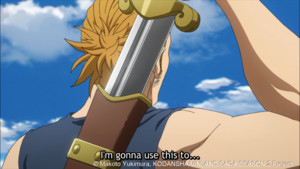
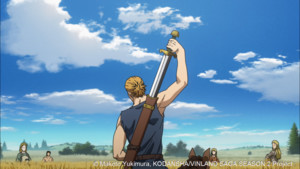

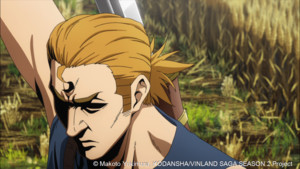
He's just an adolescent who wants to get out of his father's shadow and thinks becoming a man is the way to do it. The problem lies in defining what a "man" is and how one becomes that.


Boy, I sure hope this insecure boy with delusions of grandeur won't get sucked into a toxic and self-perpetuating culture of violent masculinity to assuage his inwardly directed shame. I hate when that happens.





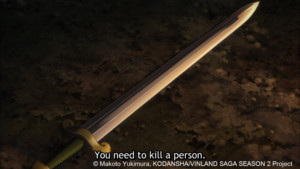

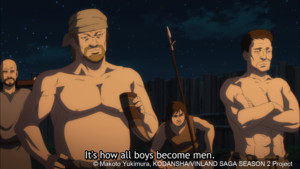
And this is one of many places where I'm blown away by how smartly and sensitively Vinland Saga is written. These bodyguards are closest to the "warriors" that Olmar valorizes, but we see them here in a time of relative peace, and it exposes all of them as a gang of bored, rowdy boys letting off steam. Olmar's like a toy to them—something to distract them for a time. Of course, he can't see that, but it's painfully apparent to the audience how fundamentally empty and immature their antics and beliefs are.
That's the aspect that makes what they do next all the more awful. Divorced from even the paltry justifications of war, it's clear just how pointless their bloodshed is.




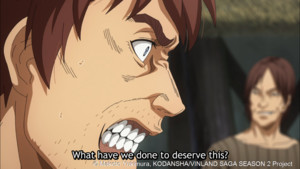
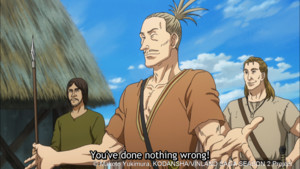
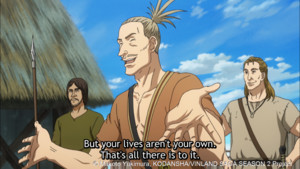

And there's nobody fitter to crash their party than somebody who has internalized that futility, albeit to an opposite, equally destructive extreme.


Kind of wild it takes until the end of episode three for Thorfinn to say something meaningful, but that shows how broken last season's ending left him. Without the fire of revenge to keep him going, all he's got is a lifetime of trauma and a negative amount of coping mechanisms.

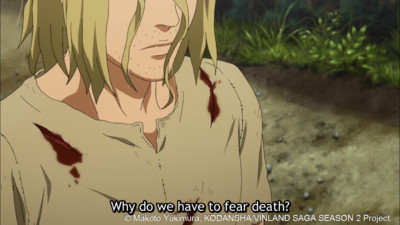
Yeah, it was evident from his attitude up to that point, but his showdown with FOX exhibits the kind of nihilism Thorfinn has embraced without any other direction. It's a colder, harder nihilism than FOX's wanton emptiness.

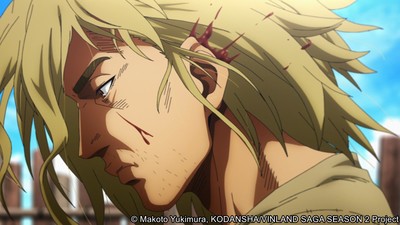
I love how that is the straw that makes the affably violent mercenary get genuinely vindictive. He wants to feel the power of instilling fear, and Thorfinn's dead-on-the-inside state infuriates him by refusing to give that up.


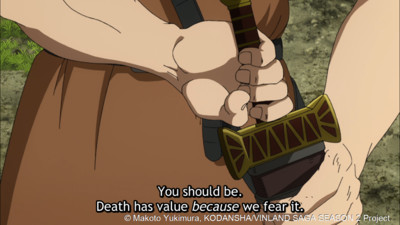
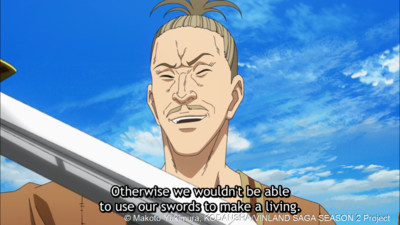
Thorfinn's also holding up a mirror to FOX's entire group. He probably has a body count comparable to their collective total, which is what it has gotten him. He's a stone masquerading as a human. Their sense of valor is a house of cards, and it's so satisfying to see it immediately crumple when their boss walks in.




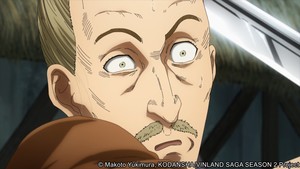



I think FOX's nose is what's crumpling at that moment, actually.
Valor is stored in the nose.
But yeah, Snake's entrance immediately puts a damper on the murder party. Right now, we don't know much about the guy, except that - to Thorfinn - his leadership and demeanor are very reminiscent of Askeladd, which has got to stir up a lot of complicated emotions.


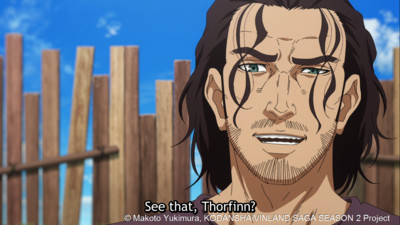
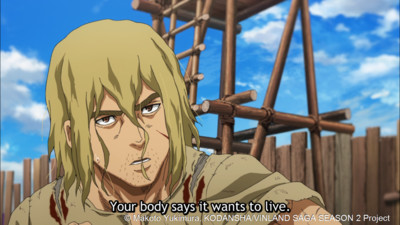
Speaking of complicated emotions, let's circle back to the boyfriends. Despite only being around for four episodes so far, Einar's already established himself as an indispensable counterweight and companion to Thorfinn.


Einar's got a lot on his shoulders; part of that is teaching this 19-year-old basic manners because the medieval equivalent of a biker gang raised him.



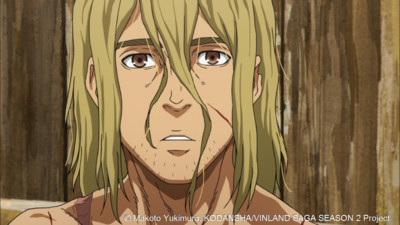
But like Thorfinn, he's also dealing with the pain, anger, and trauma weighing down his soul. It almost drives him to strangle Thorfinn, and then it drives him to cut to his metaphorical quick. Because while the weight of their pasts might be too much for either of them to bear alone, they might be able to do so if they have each other as an outlet and helping hand.




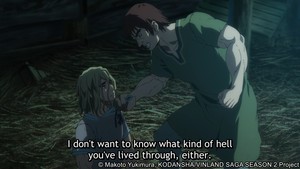
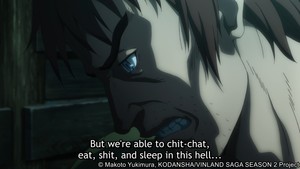


It's a hell of a scene and a moment where the anime cuts loose to expand on the source material in a way that makes all the human drama hit that much harder. You can feel the rage biting to escape from Einar throughout the entire sequence.




Yeah, even with the studio change, I'm glad to see the second season's staff is largely unchanged. It continues to be smart about its direction, especially when using closeups to communicate emotions like the anger, desperation, and frustration of no lip balm in the 11th century.




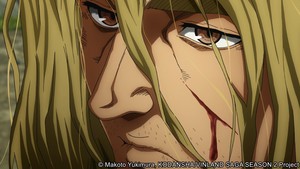

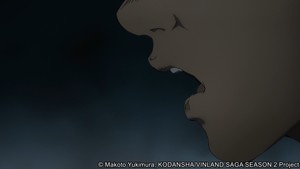

There are also some incredibly well-made callbacks. The battle Thorfinn sees in his dream is a direct recreation of a cut of animation from a battle in episode seven of last season.

The anime went with a chronological order of events, but in the manga, that was the very first chapter and our introduction to Thorfinn. So in a sense, it's his very origin haunting him all this time later.
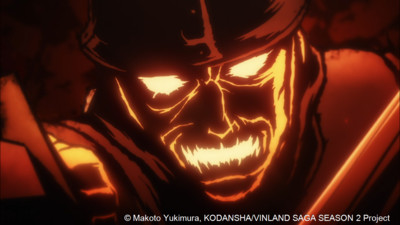
The anime went with a chronological order of events, but in the manga, that was the very first chapter and our introduction to Thorfinn. So in a sense, it's his very origin haunting him all this time later.
For the first time, though, he has someone to wake him from those nightmares. Which is rough in its own way, but it's an opportunity for Thorfinn to begin to heal. To begin to understand what healing even means.

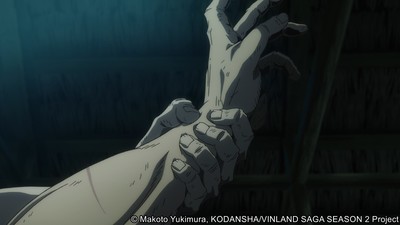
Like giving thanks, it's an important lesson he'll have to learn if he wants to have anything to live for, and I'm excited to see it play out.

I'm also excited to learn more trivia about history, like how this guy lost so badly that he got a nickname that wound up having two different, equally valid ways to say he sucks:


I'm also excited to learn more trivia about history, like how this guy lost so badly that he got a nickname that wound up having two different, equally valid ways to say he sucks:
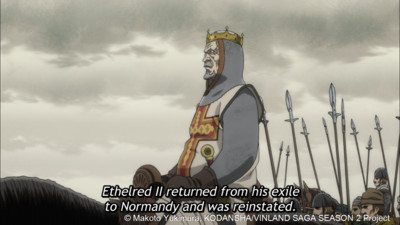
That's right, this week's episode doubles as a history lesson and an exhibition of just how hard puberty can hit one person.


It's amazing what a haircut, some eyebrow tweaking, and covert regicide can do to a mfer.
Canute's all grown up, and he seems determined to exercise softer power than his father, but softness is highly relative when your baseline is Viking warfare.



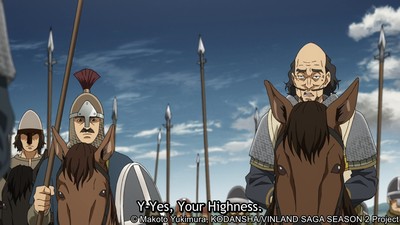
King Canute would go down in history for many reasons, not least of which being his advancements in landscaping.

But yeah, basically the entire episode is about how Canute is taking a different, more manipulative and scheming approach to conquest than his father. He's got a whole kingdom of heaven to build on Earth, which means there's no time for traditional warfare.
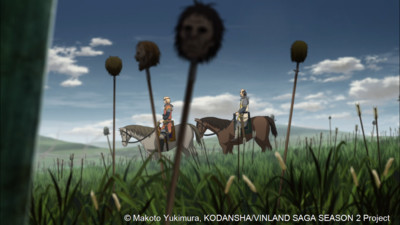
But yeah, basically the entire episode is about how Canute is taking a different, more manipulative and scheming approach to conquest than his father. He's got a whole kingdom of heaven to build on Earth, which means there's no time for traditional warfare.
As with the other character arcs, there's a sense of tragedy here, too, seeing this once-gentle lad embrace such ruthlessness. But I can't deny it's also very satisfying to see him finally wrest control of the reins of fate like this with such a fiery spectacle.


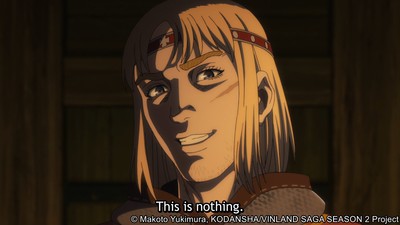

It's also the exact opposite of Thorfinn's seeming trajectory. Where that boy is slowly trying to extricate himself from the violence that's defined his life, Canute is embracing it and bending that violence to his own will. You know you're doing something wrong when Thorkell, of all people, doesn't like your approach to war.


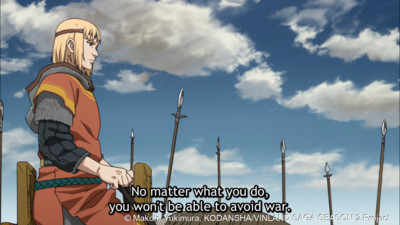
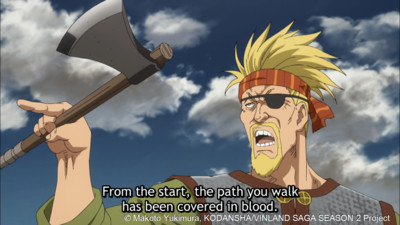
I wouldn't call Thorkell the best judge of character in the show, but he is perceptive and understands that Canute's approach can open up whole new cans of much more dangerous worms.

That, or he's just really upset about not meeting his daily dismemberment quota. It could swing either way.
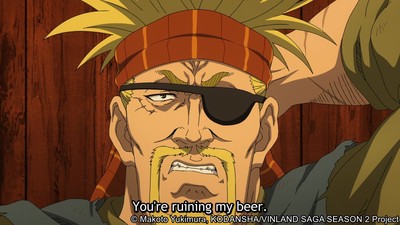
That, or he's just really upset about not meeting his daily dismemberment quota. It could swing either way.
There's simple wisdom to Thorkell's outlook. He has thoroughly embodied the violence of Viking culture, but in doing so, he shines a light on the hypocrisy of anyone who doesn't. He's here to kill or be killed and doesn't need to rationalize or justify it. It's as honest as it is terrifying!


However, even the fiercest warriors have their weaknesses.


Prejudice against one of ANN's editorial staff notwithstanding, you know where you stand with Thorkell. He would kill you without a second thought but won't begrudge you for doing the same to him. Compare that to Canute, who will get somebody else to kill you and your son.


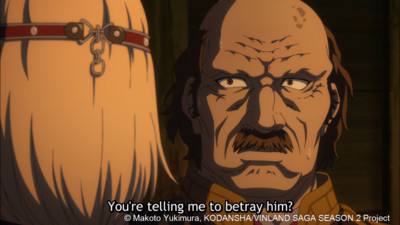
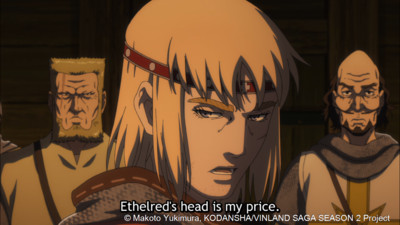
Love this conniving son of a gun and his ever-thickening facial hair. By the end of the season, I predict he'll have a full-on wizard beard and a list of war crimes spanning the length of the North Sea.

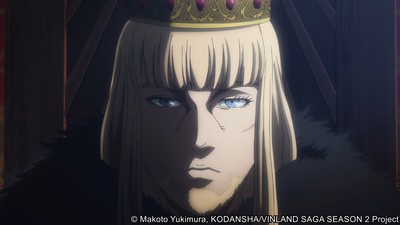
Well, I'll be there to see if that happens! Vinland Saga was already a great watch, but the level up in its writing and atmosphere this season had made it necessary viewing every week.
Yeah, I think (and would hope) that everyone knows by now that Vinland Saga is an exceptional manga and anime. But it's worth emphasizing that the sea change in this second part is a bold narrative gambit that is paying dividends in terms of thematic complexity and sensitivity. It feels like we're finally getting to the story that Vinland Saga wants to tell, and I can't wait to see where it goes from here.

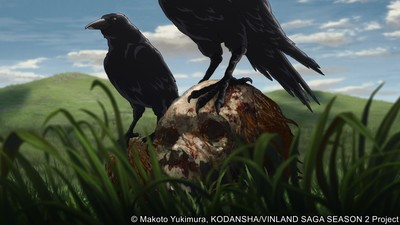
Tune in next time for more thrilling, thematically compelling, painfully human drama:

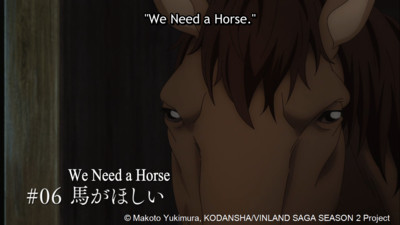
discuss this in the forum (6 posts) |